- Home
- Hanif Kureishi
Love + Hate: Stories and Essays Page 4
Love + Hate: Stories and Essays Read online
Page 4
*
I had my mirror years, and even fancied myself. For a time I was in love with what I saw. These were the days when everyone had more or less the same body shape. We all ate the same food, did the same amount of exercise at school, and how you looked was either good or bad luck, though as any Teddy boy could tell you, there was sticky stuff you could put in your hair to make you stand out.
Teenagers don’t need to be reminded that wherever they are, their body is with them as an object. Teenagers have always been keen on harming, piercing and marking themselves. Now they go to the gym and shave their bodies and wax their hair; they hyperventilate over blackheads and what they’re eating, and look critically and in wonder at themselves and each other. My boys check other boys’ bodies before they check the girls. In this exile, this period of freedom between loves, hypereroticised, wild hedonists, they can really only love themselves. One day they will look at photographs of their younger selves and be shocked by everything they couldn’t see or appreciate in themselves. And however beautiful they might be, any adult will remember that most of us when young felt a lot like Holden Caulfield or Esther Greenwood in The Bell Jar, awkward, not ready for the world, and disputing with our too-present or too-absent parents, to draw them closer, or push them away.
The age of fifteen to twenty in a kid is tough for a parent, with many cruel exchanges. The art the young are fascinated by – pop, hip-hop, video games, vile jokes, horror films – looks gratuitously sadistic. If they are fortunate enough to be able to develop all their capacities, our children, among other things, will have to become aggressive and even destructive. It is shocking, the way they say ‘fuck you’ all the time and mean it. Their necessary hatred, from the parent’s point of view, seems so final. But it is nothing like the cruelty of adults, and this sudden invasion of the nasty and unkind, of a particularly unpleasant version of reality, is an important break from the past, a form of entry into the grown-up world. The machines the kids prefer to real people – computers, phones, video games – are transitional objects for semi-adults, and function as links between life stages.
But there is something else at this time, equally violent or shocking in its own way, a shock which perhaps never diminishes, and which pornography inadequately reproduces but also illustrates. I mean the radical disturbance of sex in its aggression and need. Of how violent, gross and hateful sex can seem, or needs to be, if one is to be abandoned in it.
For me this initiation was not only into my own sexuality, but a move away from adolescent solitude and narcissism – towards a woman, women, and more interesting dangers. This is one of the most difficult and important questions for a young man: how do you engage with or understand female sexuality? My parents’ relationship never seemed sensual; it didn’t appear to be that kind of love: they were companions who cared for one another. Appearance, yearning, or the game of love, didn’t seem important to them, even in their speech.
Where do you learn how to desire, then? How do you allow a woman to teach you about their pleasure? At least I grasped that I would have to make a space for desire to occur. Then, I suppose, one just had to pay attention. Living more authentically, and being more politicised and aware of their situation and who they were – women becoming subjects in their own right, as it would have been put then – the women I knew were far ahead in the way they considered their identity and what they wanted to be.
I was afraid of excitement, of women, of sex, of losing my bearings and my mind. I must have been seventeen when a woman gave me acid, pulled up her top and invited me to lie down so she could masturbate me. She did it slowly, almost as an exercise, to show me what was possible, how she might control me and how I could learn to synthesise pleasure. Lying there, I witnessed her concentration, and then I let go and tripped in my head. At the end I felt paralysed, and it took me a few minutes to learn to walk again. A little older than me and more knowledgeable about everything, she was experienced enough to say – when I came round – that that wasn’t all.
There was something else. It was, she explained, difficult for her to masturbate in front of a man; she felt exposed and embarrassed. But if she could get over that, I might see something essential or even useful for the future. After all, it took a man to know a woman, to understand her needs and passion, to look at her as she wanted to be seen. So she pulled down her clothes and showed herself. You have to admire the nerve of someone who could do that. She came quickly, and a few times more. I held and kissed her, amazed and fascinated by the beauty and intensity of this form of education, and I wondered what she needed me for, and what I could be for her, if anything. She said, well, you can’t hold your own hand, and you can’t desire or make love to yourself, can you?
*
My father and I would walk in the park on the weekends. Dad always had the immigrant’s optimism. He believed we ought to succeed in the new country; that was why he wanted to be here. Yet I still don’t know how his conversations were so inspiring. It was a great thing he had, knowing how to make you excited about the future, about what could be achieved and the pleasures which were possible. Not, of course, that you were allowed to leave him behind. My father, neglected by his own father, indeed by both his parents, broke and re-established the trans-generational inheritance, and became a good father himself. Yet he required his children as friends and accomplices. Now I am like him, and much different. He’s long dead but every day I am in conversation with him. I’d like him to be here so I could kiss him or kill him.
*
My youngest son and I, on our run, slow down. My legs are tired; we walk together. I like to walk slowly. This is how we can talk about schools, sports, magic tricks, concentration, his friends, and how he’d never read anything I’d written. It’s a lovely long moment between conflicts. From the parent’s perspective, it is not hard to frighten or control young children, even when they are maddening. But – difficult to intimidate and almost impossible to charm – teenagers generate more hate, rage and envy than even the steadiest people can bear. A teenager can turn a fine person into a maniac in ten seconds. The more they need you the more anger they might need to get away – hatred is an important catalyst for change – and you can only have power over those who are dependent on you. You’ll never get anywhere with a teenager by appealing to your own interests, but they usually respond to money, and if you can involve them in something they like, or want to say, they can, for a bit, be good, amusing company.
There is a lot here for the parent to learn about separation. For what the kid sees as growing up and freedom is, from the angle of the parent, a fatal break-up. During the long divorce of the child’s teenage years, it can feel as if you are slowly being deserted by one of your dearest friends. You will ask yourself what is left now you have almost completed this job. I can recall wondering at the time I left home, in the mid-70s, who my father would discuss literature and sport with.
Now I must remind myself, since Muslim fathers are very present, that I am the son of a mother too. Not that my mother much enjoyed being maternal; it was all a nuisance. She liked us as an excuse or obstacle, so we could appear to be in the way of something better. Yet when we were gone, nothing new happened. At the time I was leaving home, Mother seemed to become defensive and almost inert, as if she’d lost her vitality under layers of her own body. Television had been a novelty when I was a kid; we were amazed it existed at all. Soon Mum barely moved from the intoxicant of the TV, which she watched with increasing avidity. To me, she had fallen in love with something or, indeed, someone else, an insidious thing, a shadow-world, which appeared to provide no suffering or condemnation, unlike sex or alcohol, but only a constant, mild level of diversion. Eternally distracted by the only truly living figures in what we misguidedly called the living room, it soon seemed as if television was the single life which could compel her – people on a screen she couldn’t actually reach and didn’t have to talk to. In a way, I had lost both my parents.
The
lesson here might be: you cannot use your kid or your parents as a prop, as a substitute for other relationships, or as a reason for not relating as an adult to other adults. Even parents have to grow up.
*
What will be significant in a life can’t be discovered in advance, or even at the time. Meaning, trauma even, is a later construction arising from a realisation. I mean that people experience some sort of pain or feeling of loss; they know there’s been some inexplicable breach, but they don’t know exactly what it means. A writer, like a dreamer, is an ‘interpreter’ of experience, which makes writing an important form of thought, inscribing an event in the right place in the narrative you’re using at the time, or opening a space for a new one.
Speaking is easier than writing. There are no ‘creative speaking’ classes, though there should be. The danger and virtue of speaking is incontinence or spontaneity – speaking as a form of unpredictable performance. Most people can speak, they rarely stop, they need to get it out. You can’t really plan a conversation; it’s an improvisation made by at least two, and truth escapes through one’s fingertips. Someone can pull you through your defences, like picking a winkle.
Writing appears to be more manageable. Writing, like reading, is usually done in solitude, and there is nothing natural about it. Since people are their own obstacles and like to undermine themselves, it is an effort in overcoming. To write is to find out if you can be less afraid of yourself, less inhibited – freer, wilder, and yet able to structure your work. A thought occurs; you put it down, and revise it a dozen times, and then another ten. Most people can’t write well; it’s awkward, slow work, when done by hand. For me that is the best way, especially at the beginning of a project, when slowness and thought matter. Since it is abstract and self-conscious, as well as a form of separation and withdrawal, writing disconnects you from experience, freezing it. Sometimes this disconnection can feel like a sort of killing. Some young writers can even feel that if they write from their own life, or about their own family, that this objectification can be like murdering your own parents. They are rightly nervous of the amount of conflict and aggression which creative exploration seems to invite. No wonder they can feel inhibited. It’s easier to avoid difference and the problem of taking power, to play dead and choose to be passive or submissive, than to argue or be individual. But the price is higher.
*
For young writers there is no audience. No one real hears them yet. They have to attempt difficult things. They must work at ideas which are beyond them. It would be sensible for them to find a good teacher, one who would push them. That would be their apprenticeship, when they would be rejected, criticised and knocked down repeatedly, as they would be in the world. Most of the young writers I teach don’t produce enough work. They’re over-anxious about the quality of what they’re doing, not bold enough, and, later on in the process, not tough enough when it comes to cutting and rewriting.
But at least if you can see writing as a form of costume or masking, you can see that it can be learned. The voice, the point of view, is a put-on. All this is pretence, a form of magical play, like string-work with more omnipotence. Even forms of recently fashionable ‘confessional’ writing, which appear to be told like it was, require as much art and construction as any thriller, which is why often these pieces turn out to be more fictional than intended. And this is more than just expressing oneself. The writer is a fiction, having created herself out of what she has been given.
I would go further. When you write, you are addressing other people; there is always someone else there, someone who sees you. And this absent reader whom the writer imagines – the subject the writer is trying to take on an outing, the implicit receiver of the words, the one who should understand – is also a fiction, an essential one. This fiction orientates the writer. The reader makes the writer possible. Yet thinking of the reader makes the writer anxious. This reader is judging you. This reader recognises you, and reads you properly. The reader wants to be fascinated and enchanted. This is the crucial question for the writer, as it is for any person. How do we keep the other’s attention? How do we keep their desire for us alive? What do they see, and do they love us? Will they forgive us our mistakes? Are we giving them something they want, something they don’t want, or something else altogether? Living with such anxiety, and answering it back, justifying your work, is necessary to the process.
Some writers think their characters have to be sympathetic. That is not at all necessary or common in good writing, and cute characters are off-putting. Obviously, you’d no more read a book on the basis of its characters being likeable than you’d choose a lover because they were nice. All that must happen is for the reader to become involved with the writer’s people, and see themselves in the conflicts and dilemmas the writer produces.
*
The devilish character Jack Tanner in George Bernard Shaw’s Man and Superman states, ‘The true artist will let his wife starve, his children go barefoot, his mother drudge for his living at seventy, sooner than work at anything but his art.’
In his witty essay ‘The Writer on Holiday’, Roland Barthes considers this romantic idea of the place of the writer in the public imagination. If writers are ‘specialists of the human soul’ or ‘professionals of inspiration’, the writer simply cannot go on holiday like other workers because he – and it is usually a he – isn’t someone with a job. Art is a calling. A real writer is always a writer, and he can’t help it, he just has to do it. This kind of pure artist – Shelley, Rimbaud, Van Gogh, Kafka, Plath, Nina Simone or the young Dylan, say – can’t leave himself behind, or turn off his mind, since you can’t cancel your subscription to inspiration. The Muse is a sort of ‘inner tyrant’. And not only is the artist possessed, he must pay a high price for his devotion. He should sacrifice not only his time and financial security, but should also forsake the safety of being a good person. Mad and difficult, he must place his work before his wife and children, whom he would rather see ruined than compromise his will.
This amusingly misleading but not uncommon notion of the artist a moment away from hacking off his own ear prevents us from seeing art where it mostly is: in the market, in collaborationist if not negotiated forms like pop and the cinema, and in most types of craft. The written word, and the story, is still fundamental to us. Everything we see on TV or in the cinema, and every song we hear, was written down first. The idea of the romantic artist separates the use of the imagination from the rest of the public. The idealisation of the artist is a limitation which leads to impoverishment elsewhere, and can cause us to forget that the imagination extends to all areas of life.
*
Recently it has become common in film and television, and also in the novel, for the story idea to be based on the lives of real people. These are usually celebrities of some sort, often enduring a particularly dramatic period in their lives. It could be Nelson Mandela, Princess Diana, Tony Blair, Queen Elizabeth the First, Virginia Woolf, Sylvia Plath, Van Gogh, or a sportsman, actor or murderer. Mad poets and mathematicians are popular, nicely illustrating the popular idea that genius and idiocy are never far apart. For a producer or a writer, this can seem like a good solution to the problem of finding a story. Most of the work has been done. The characters already exist in the public imagination; the action has taken place, and the writer will have a good idea of how these people might speak and what they might say.
Most of this sort of writing is market-driven and is often commercial. On the other hand, the writing schools are full of middle-aged women who have growing kids. These eager students have turned to creative writing not to become well-off by working in television, but rather to find out – using the medicine of art – how they became who they are. They know that sanity depends on language, and writing is, as much as anything, a form of working meditation. There is, in silence with one’s thoughts, an opportunity for memory to work. At the same time, to study writing in a university makes art appear arduous and respe
ctable. Essays are written and classes are attended, and you leave the university stamped with credits. It is as if writing is an academic discipline rather than a species of unpredictable entertainment and psychic stripping, by which an audience may or may not be impressed.
The university gives a necessary semblance of respectability. If men are martyrs for their art, women like to be martyred for their children. They cannot suffer enough; it is a mark of love. How torn they are between the page and the kid. It is as if the parent’s essential duty is to give the child everything until there is nothing left, rather than showing her the necessity of creativity and how important it might be to write – as a form of disruption, of internal reorganisation and recreation. Not that writing is a particularly masculine activity. Men are not better writers than women, but women can be more divided here. It might take a man to be ruthless enough to find the space and time to learn to write. Children can be a framework and a spur. If it is indulgent for any art to move too far from the market, and for the market to move too far from art, fatherhood makes you serious. It wasn’t until I had children that I saw I had to concentrate. I had to get on with it, making more work, supporting the children with my pen, or find, for the first time, a proper job.

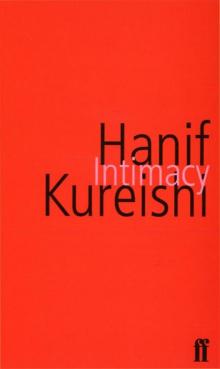 Intimacy
Intimacy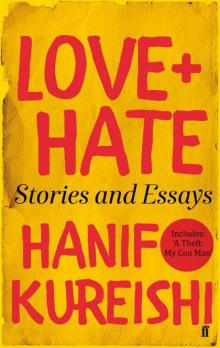 Love + Hate: Stories and Essays
Love + Hate: Stories and Essays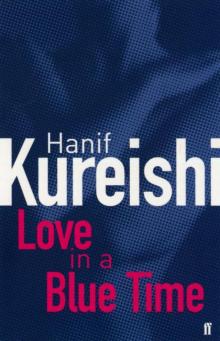 Love in a Blue Time
Love in a Blue Time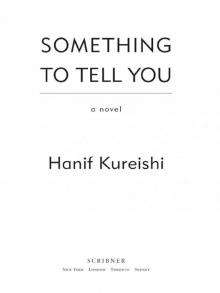 Something to Tell You
Something to Tell You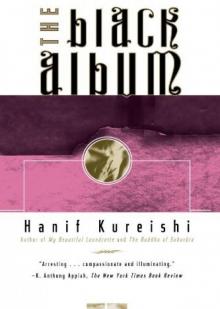 The Black Album
The Black Album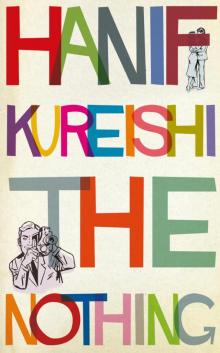 The Nothing
The Nothing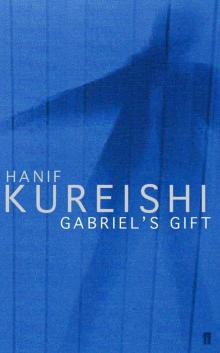 Gabriel's Gift
Gabriel's Gift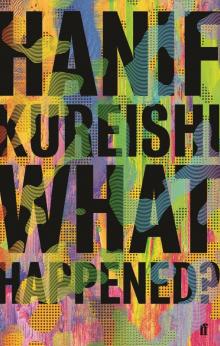 What Happened?
What Happened?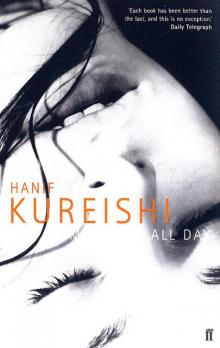 Midnight All Day
Midnight All Day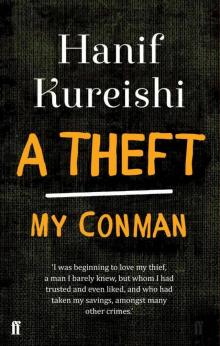 A Theft: My Con Man
A Theft: My Con Man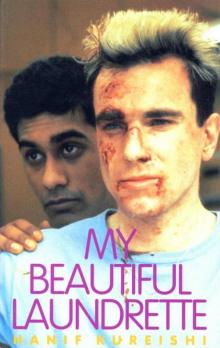 My Beautiful Launderette
My Beautiful Launderette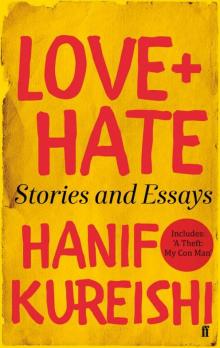 Love + Hate
Love + Hate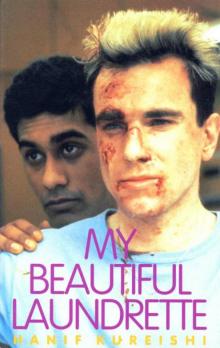 My Beautiful Laundrette
My Beautiful Laundrette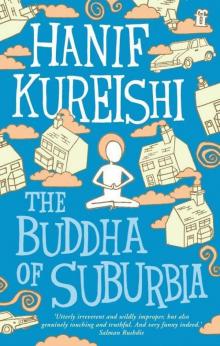 The Buddha of Suburbia
The Buddha of Suburbia